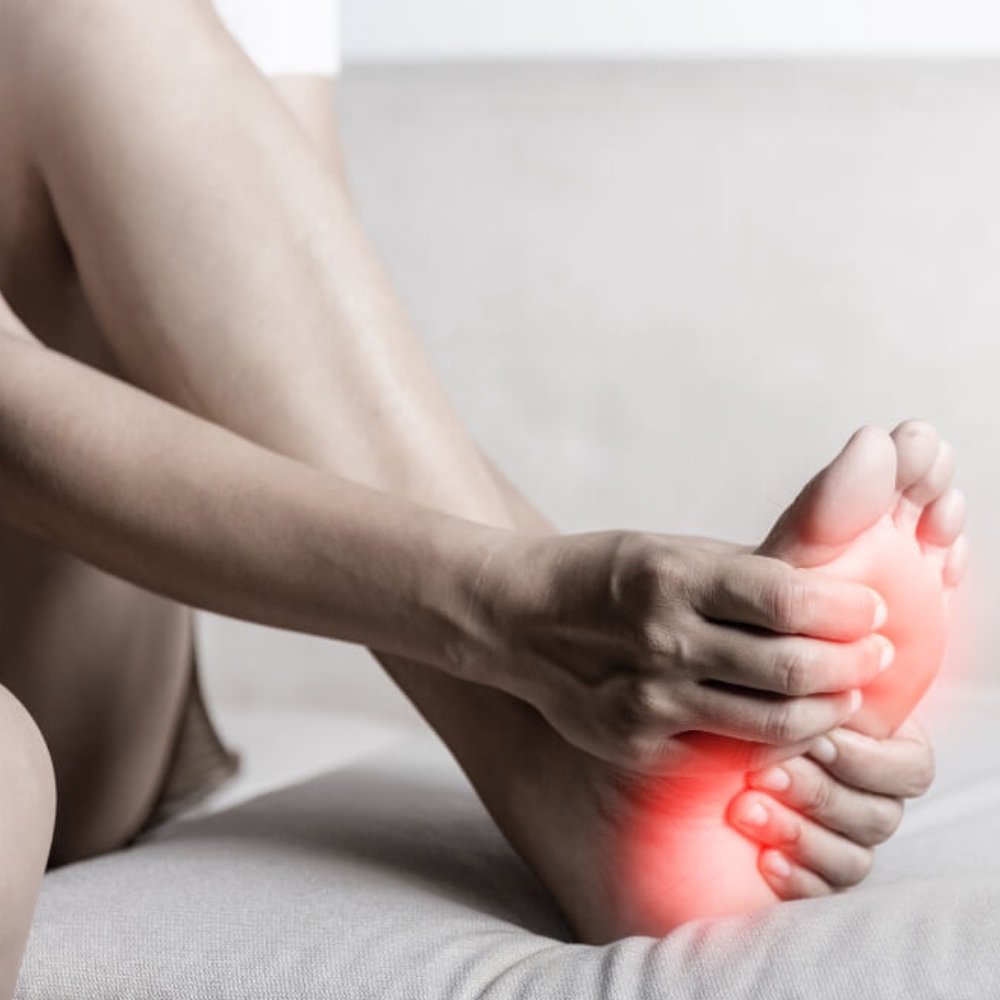
Peripheral Neuropathy Treatment
Peripheral neuropathy refers to a condition involving damage to the peripheral nerves, often causing weakness, numbness, and pain, typically in the hands and feet. Your local foot doctor at our office will provide a comprehensive approach to treating peripheral neuropathy to alleviate symptoms, improve nerve function, and enhance quality of life.
Here’s a detailed guide to the treatments we offer:
1. Diagnosis and Evaluation:
- Purpose: Identify the underlying cause and assess the extent of nerve damage.
- Description: Your podiatrist will conduct a thorough medical history review and perform a physical examination to evaluate symptoms such as tingling, numbness, burning pain, or sensitivity to touch. Diagnostic tests may include nerve conduction studies, electromyography (EMG), blood tests, and imaging studies to determine the underlying cause of peripheral neuropathy.
2. Management of Underlying Conditions:
a. Diabetes Management:
- Purpose: Control blood sugar levels to prevent further nerve damage.
- Description: For diabetic neuropathy, maintaining tight control of blood glucose levels through medication, diet, and lifestyle modifications is essential to slow the progression of nerve damage and improve symptoms.
b. Treatment of Autoimmune Disorders:
- Purpose: Manage autoimmune conditions affecting the peripheral nerves.
- Description: Medications to suppress the immune system and reduce inflammation may be prescribed to treat autoimmune neuropathies such as Guillain-Barré syndrome or chronic inflammatory demyelinating polyneuropathy (CIDP).
3. Symptom Management:
a. Pain Relief Medications:
- Purpose: Alleviate pain associated with peripheral neuropathy.
- Description: Medications such as over-the-counter pain relievers (e.g., acetaminophen, NSAIDs) or prescription medications (e.g., gabapentin, pregabalin, tricyclic antidepressants) may be prescribed to manage neuropathic pain. Topical treatments containing capsaicin or lidocaine can also provide relief.
b. Physical Therapy:
- Purpose: Improve strength, balance, and mobility.
- Description: A physical therapist can design a customized exercise program to improve muscle strength, enhance coordination, and promote circulation to affected areas. Physical therapy may also include techniques such as massage, ultrasound therapy, or transcutaneous electrical nerve stimulation (TENS) to alleviate pain and improve nerve function.
c. Orthotic Devices:
- Purpose: Provide support and alleviate pressure on sensitive areas.
- Description: Custom orthotic inserts, braces, or splints may be recommended to support proper foot alignment, reduce pressure on nerves, and prevent complications such as foot ulcers or deformities. Proper footwear with cushioned soles and adequate arch support can also help improve foot function and reduce discomfort.
4. Lifestyle Modifications:
a. Foot Care Practices:
- Purpose: Prevent complications such as foot ulcers or infections.
- Description: Educate on proper foot care techniques, including daily inspection of feet for cuts, blisters, or sores, gentle washing and drying of feet, moisturizing dry skin, and avoiding barefoot walking to minimize the risk of injuries.
b. Pain Management Techniques:
- Purpose: Reduce stress and improve overall well-being.
- Description: Techniques such as relaxation exercises, meditation, acupuncture, or biofeedback may help alleviate stress and improve coping with chronic pain associated with peripheral neuropathy.
5. Advanced Therapies:
Medication Management:
- Purpose: Manage symptoms and improve quality of life.
- Description: Your podiatrist may work with other healthcare providers to adjust medications or explore alternative therapies such as intravenous immunoglobulin (IVIG) or plasma exchange for severe autoimmune-related neuropathies.
6. Patient Education and Support:
- Purpose: Empower patients to manage peripheral neuropathy and optimize treatment outcomes.
- Description: Provide ongoing education on the importance of adhering to treatment plans, monitoring symptoms, and seeking prompt medical attention for any changes or new symptoms. Support groups or counseling may also be beneficial for emotional support and sharing experiences with others facing similar challenges.
7. Follow-Up Care:
- Purpose: Monitor progress and adjust treatment as needed.
- Description: Schedule regular follow-up visits with your podiatrist to assess the effectiveness of treatments, monitor for complications such as foot ulcers or infections, and adjust medications or therapies based on your response and overall health status.
Why Choose Axis Foot & Ankle?
- Expertise: Our podiatrists specialize in diagnosing and treating peripheral neuropathy with advanced techniques and personalized care plans.
- Compassionate Care: We prioritize your comfort and well-being throughout your treatment journey.
- Comprehensive Approach: From conservative treatments to advanced therapies and collaborative care with other specialists, we offer comprehensive care to effectively manage peripheral neuropathy and improve your quality of life.
If you are experiencing symptoms of peripheral neuropathy in Shrewsbury Middletown, Holmdel or nearby areas, contact Axis Foot & Ankle for expert evaluation and personalized treatment. Schedule an appointment today to start your journey toward relief and improved nerve function.
